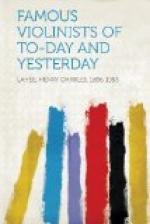Burmester plays with unassuming simplicity and without cheap display. He is sincere, but without authority or distinction of style. His tone is warm and pleasing, but not large, his intonation is not always sure.
One of Burmester’s earliest musical friends was Hans Von Buelow, and the friendship extended over a period of three and a half years, until Von Buelow went to Cairo shortly before his death.
Von Buelow had inaugurated a series of orchestral concerts in Berlin, and as they interfered with the Philharmonic series every effort was made to put a stop to them. Musicians were forbidden to play for Von Buellow, and many obstacles were placed in his way. Von Buellow’s temperament was such as to intensify the hostility rather than succumb to it. Burmester was then only sixteen years old, but his sympathy was with Von Buellow, and he wrote a letter to him offering his services, and expressing his contempt for the injustice to which he was being subjected. Von Buellow invited him to attend the rehearsals, and printed the letter which he had received. Burmester accepted the invitation, and, going to the rehearsal, found vacant a seat amongst the first violins, which he took.
The rehearsal was about to commence when Von Buellow paused and asked, “Which of you gentlemen is Burmester?”
The young fellow approached Von Buellow, who had motioned him to come.
“Mr. Burmester,” he said, “I have no desk in the first row to offer you or it would be yours. Gentlemen,” he added, turning to the musicians, “I wish to introduce to you the guest of honour of my orchestra, Mr. Burmester.”
This was the beginning of a friendship, through which the young violinist showed unswerving loyalty, and it is now one of his greatest desires to reach a point of independence which will enable him to build a monument to Von Buelow’s memory.
In 1893 a sensation was created in America by the visit of Henri Marteau, a young French violinist whose excellent playing and charming personality delighted all who heard him. Marteau was called “the Paderewski of the Catgut,” and he met with a most cordial reception among musicians.
Marteau was born at Reims in 1874. His father was an amateur violinist and president of the Philharmonic Society of Reims. His mother was an accomplished pianist, a pupil of Madame Schumann. He therefore had every advantage in his early youth for the development of musical taste. When he was about five years of age Sivori paid a visit to the family, and was so charmed with the little fellow that he gave him a violin, and persuaded his parents to let him become a professional violinist. Marteau now began to take lessons of Bunzl, a pupil of Molique, but three years later he went to Paris, and was placed under Leonard. In 1884, when ten years of age, he played in public before an audience of 2,500 people, and in the following year he was selected by Gounod to play the obligato of a piece composed for the Joan of Arc Centenary celebration at Reims, which piece was dedicated to him.




